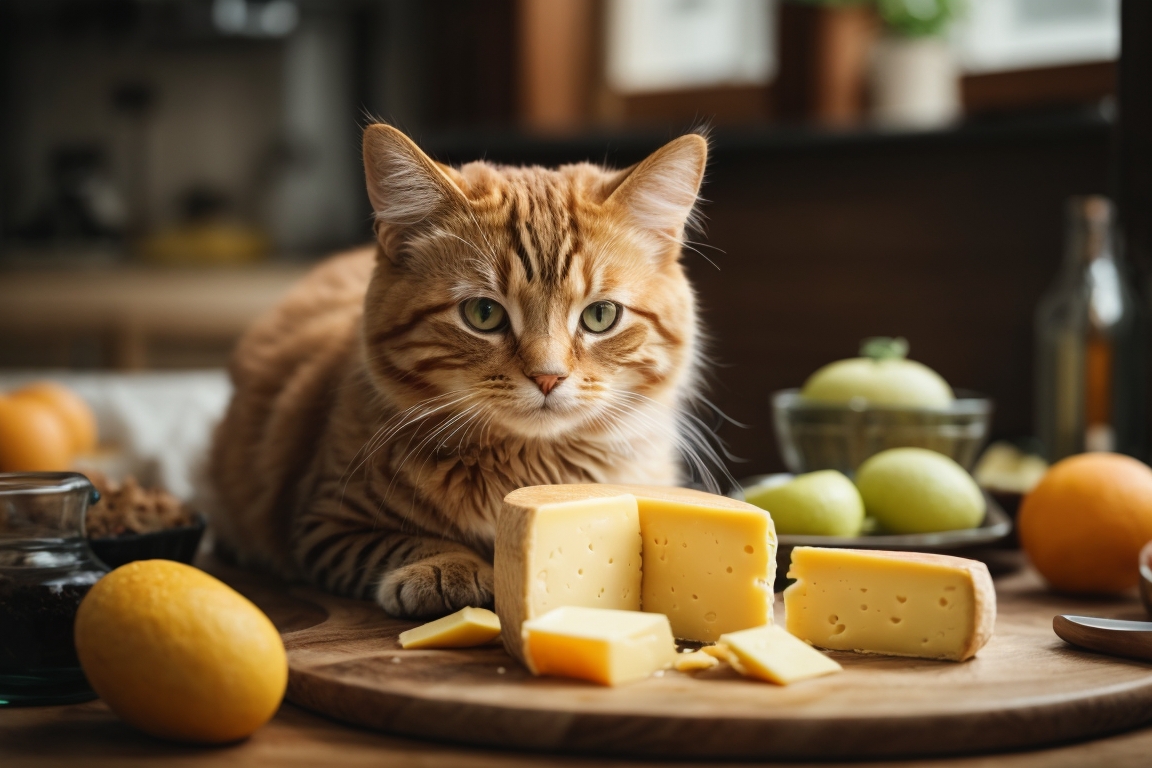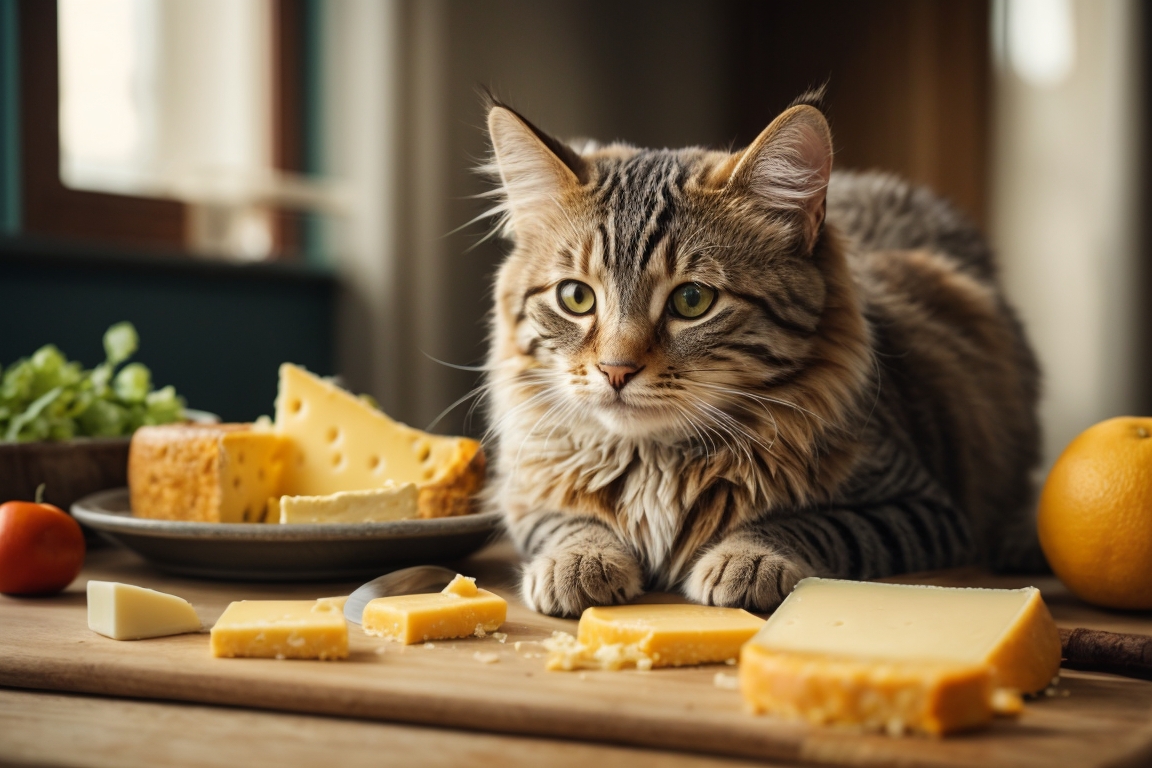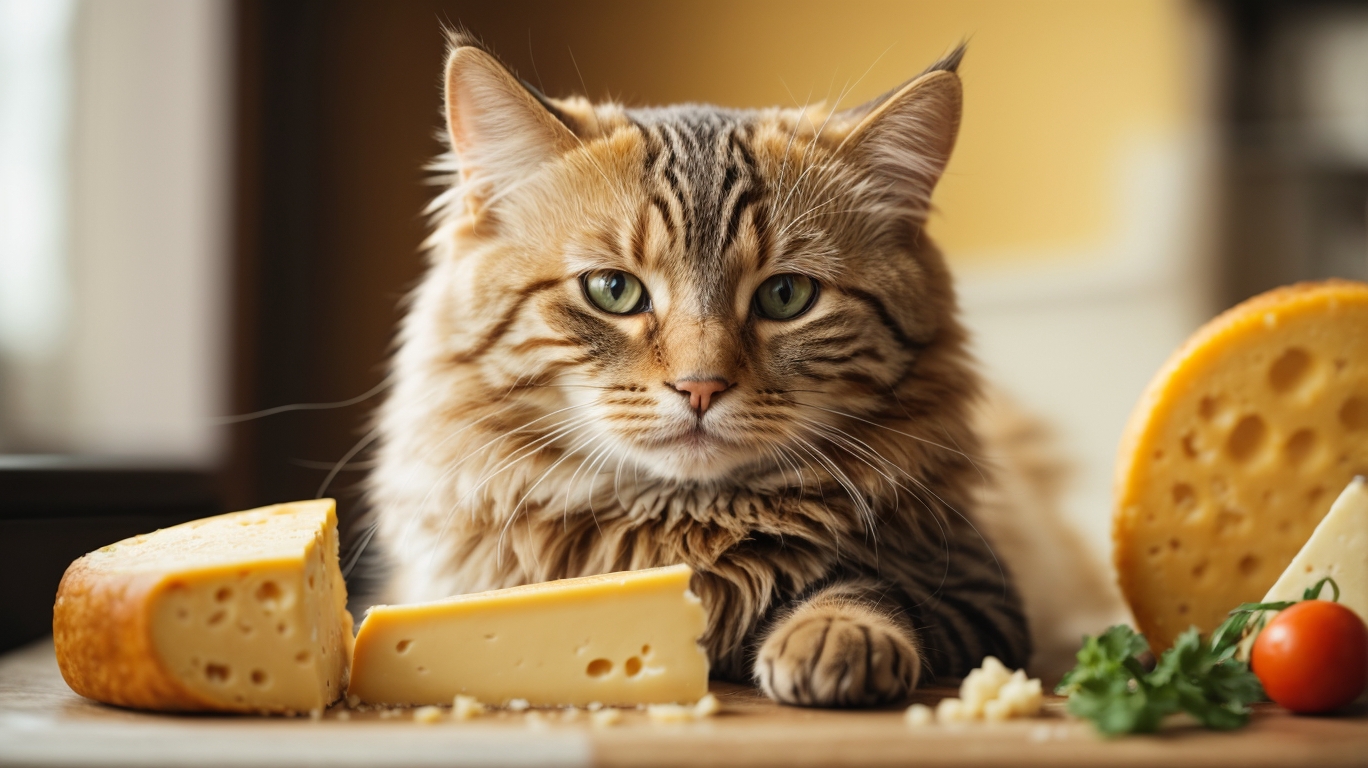Cheese. It’s one of life’s simple pleasures for many humans. A nice wedge of cheddar, brie baked into a gooey appetizer, parmesan sprinkled atop pasta. While cheese makes for an enjoyable snack for people, is it safe for our feline friends to partake? Or can cheese actually kill cats?
If you’ve ever noticed your cat begging for a bite of your cheese platter or swiping slices off a sandwich, you may wonder can I give my cat cheese? It’s normal to want to share tasty treats with pets. But before you offer Fluffy a cheese cube, it’s important to understand the risks dairy can pose for cats.
Table of Contents
Can Cheese Kill Cats ?
While tiny amounts of cheese likely won’t harm cats, it is not an appropriate snack. Cheese contains several components that can cause health issues for cats:
Lactose Intolerance
Cats’ digestive systems struggle to break down lactose, the sugar found in dairy products like cheese. Where humans continue producing the enzyme lactase to digest lactose into adulthood, cats begin losing this ability after weaning in kittenhood.
Without sufficient lactase, undigested lactose passes through the intestines, attracting water into the digestive tract via osmosis. This leads to diarrhea and other gastrointestinal upset.
High Fat Content
Another concern with cheese is its high fat content. On average, cheese contains around 33% fat. While delicious for humans, these high fat levels can be problematic for cats for a few reasons:
- Cats’ small size makes them prone to developing obesity and pancreatitis when overfed fatty human foods like cheese.
- Feline livers are not as efficient at metabolizing fat and cholesterol compared to humans and other mammals.
- Excess fat taxes the feline digestive system and can cause nausea, vomiting, and diarrhea.
Cholesterol Concerns
In addition to fat, cheese contains appreciable levels of cholesterol. Cow’s milk has an average of 14-17mg cholesterol per ounce.
Cats’ bodies are not adapted to processing the large amounts of cholesterol found in dairy products. Over time, excess cholesterol from cheese can contribute to:
- Hyperlipidemia – dangerously high blood lipid levels
- Atherosclerosis – plaque buildup in arteries
- Liver disease
Other Adverse Effects
Beyond indigestion and weight gain, cats may experience other adverse reactions after eating cheese:
- Allergic reactions – symptoms like dermatitis, swollen face/throat, wheezing
- Lactic acid buildup – some cats are sensitive to lactic acid in fermented cheeses
- Stomach obstruction – cheese can harden and block cats’ narrow digestive tracts
So while an occasional lick of cheese may only cause some stomach upset, regularly feeding cheese to cats can have much more severe health consequences.
Why Cats and Cheese Don’t Mix

Clearly cheese and felines are not a good combination. But why are cats so sensitive to dairy products compared to some other species? There are a few key reasons:
Evolutionary Diet
First, as obligate carnivores, cats evolved eating a diet based on the meat of prey animals. The feline digestive system adapted over thousands of years to process proteins and fats from animal flesh, not lactose from milk.
Cats lack specific metabolic pathways to utilize the nutrients in cheese and other dairy efficently. Their bodies are simply not designed to handle it well.
Milk is for Kittens
It also comes down to life stage – kittens can tolerate milk and dairy better than adult cats because nursing is essential to their early development.
Kittens possess higher levels of lactase to digest their mother’s milk. But as cats mature, most lose the majority of the lactase enzyme. This makes dairy difficult for grown cats to digest.
Sodium Content
Cheese is also very high in sodium, with processed types like feta and bleu cheese exceeding 300mg per ounce.
These high sodium levels can lead to:
- Hypernatremia – elevated sodium in the bloodstream
- Excessive thirst and urination
- Neurological issues from cellular swelling
So cheese can rapidly throw off electrolyte balance in cats.
Food Allergies
For some felines, dairy proteins in cheese can trigger allergic reactions and exacerbate food sensitivities. Reactions typically develop after repeated exposure over time.
Diarrhea, vomiting, and skin conditions like eczema are common cheese allergy symptoms in cats.
Which Cheeses are Most Harmful to Cats?
If you really must give your cat a tiny taste of your cheese plate, are some types safer than others? Here is how common cheese varieties compare:
Soft Cheeses
High-moisture soft cheeses like brie, ricotta, cottage cheese, and feta tend to be most problematic for cats. Their high lactose content makes digestion difficult. Increased perishability also raises the risk for bacterial or mold contamination.
Aged Hard Cheeses
Aged hard cheeses like cheddar, parmesan, and Swiss have lower lactose levels, so are minimally easier for cats to digest. However, their fat and cholesterol content remain troublesome. Also, fermentation introduces compounds that can irritate some cats’ stomachs.
Mold Ripened Cheese
Mold-ripened varieties like camembert, bleu, and gorgonzola raise toxicity concerns. Their fungal coatings introduce mycotoxins that may cause neurological issues in cats when ingested.
Processed Cheeses
Heavily processed types like cheese spreads and nacho cheese are very high in salt, artificial flavors, and preservatives – substances that do not align with feline nutrition needs.
Overall, no cheese type can really be considered totally “safe” for cats. Even small, occasional amounts may cause digestive upset or allergic reactions in sensitive felines. It’s best to avoid sharing cheese with cats entirely.
Warning Signs of a Bad Reaction in Cats
How can you tell if your cat has a negative reaction after eating cheese? Watch for these common symptoms:
Vomiting and Diarrhea
If your cat begins frequently vomiting or having loose, watery stool shortly after ingesting cheese, their digestive tract is likely struggling to cope. These are the most obvious signs of dairy-induced gastrointestinal upset.
Dehydration
Repeated episodes of vomiting and diarrhea quickly deplete a cat’s body of fluids and electrolytes. Dehydration is a serious risk requiring urgent veterinary treatment. Watch for symptoms like lethargy, dry gums, and skin tenting.
Loss of Appetite
A cat feeling nauseous from cheese may turn up its nose at food. Try tempting with their usual favorite treats – if your cat refuses everything, something is wrong.
Breathing Difficulty
Wheezing, coughing, and swelling of the face or throat point to a potentially life-threatening allergic reaction. Seek emergency vet care.
While most cats will only experience stomach upset from cheese, severe symptoms warrant an urgent vet visit to address dehydration, pain, and allergic response. Call your vet with any concerns.
Safe, Healthy Snacks for Cats

Sharing snacks with pets promotes bonding. But what foods align better with feline nutrition than cheese? Consider these alternatives: Natural Cat Food
Lean Meats
Cats thrive on a meat-based diet. Try serving small amounts of:
- Cooked chicken, turkey, beef
- Canned tuna or salmon packed in water
- Deli turkey, ham (uncured, no honey or raisins)
Tip: Remove any bones, spices, onions, or garlic, which are unsafe for cats.
Cat Treats
Treats made from meat, fish, or insect protein provide a tasty, nutritious alternative cats love. Search for limited ingredient products without dairy.
Vegetable Broths
Offer small amounts of low- or no-sodium vegetable broths without onions or garlic for hydration and enrichment.
Pet Milk Replacements
These commercial milk substitutes for cats provide protein while being lactose-free and lower fat. But transition slowly, as some cats refuse the taste.
By understanding the health risks cheese poses for cats, we can make better snacking choices to protect their wellbeing. While cheese may taste delicious to us, cats simply aren’t equipped to process it properly. Your furry friend will be much happier – and healthier – without it.
Frequently Asked Questions
Why do cats beg for cheese if it’s bad for them?
Cats often beg for human food out of curiosity and opportunity – not because it’s actually good for them. Many detect the strong smells and salts in cheese and instinctively want a taste. But their bodies aren’t designed to digest dairy well. What smells enticing may still harm cats.
Can I give my cat just a little bit of cheese?
While a tiny crumb of cheese once in a while likely won’t cause major issues for most cats, it’s still not worth the risk. Even small amounts of dairy can trigger stomach upset, allergies, and other problems. It’s safest to avoid feeding any cheese at all.
What about lactose-free cheese?
Lactose-free cheese eliminates the lactose that cats struggle to digest. However, it remains high in fat, cholesterol, and sodium – still problematic for cats’ health. It’s best to avoid all cheese, even lactose-free kinds.
Can kittens have cheese since they drink milk?
While kittens are able to digest milk and dairy better than adult cats, cheese still poses risks. The cultured products and high fat content make it hard on developing digestive systems. Limiting cheese and only feeding kitten milk replacement is safest.
Are cheese rinds safe for cats?
No, avoid giving cats any part of cheese. The rinds, crusts, wax coatings, and mold contain compounds that may be toxic. Cats should never consume cheese in any form.

